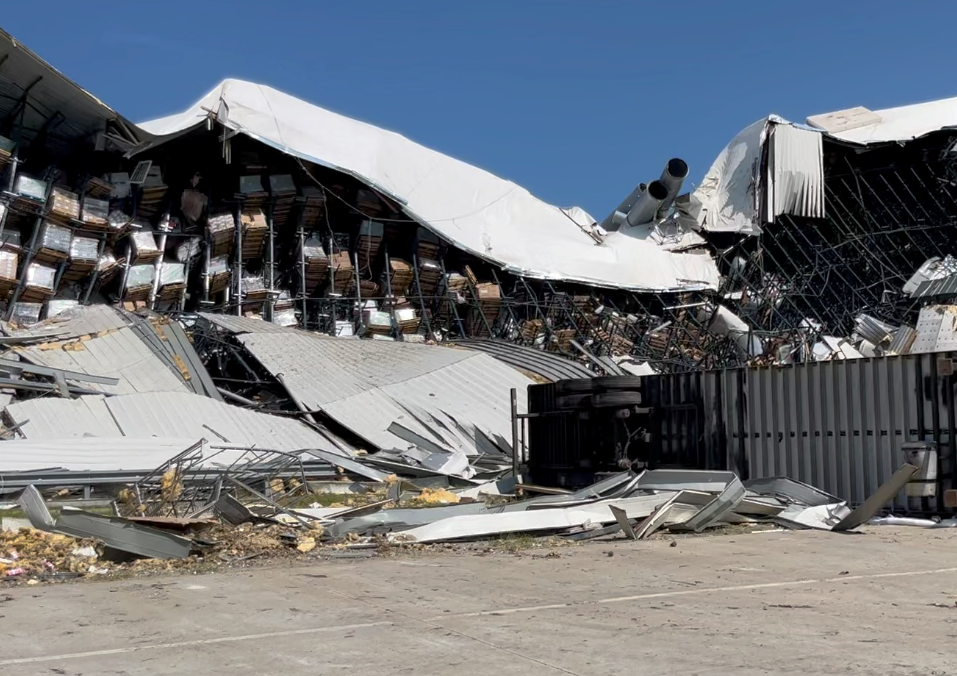Pfizer Inc. announced the pharmaceutical company’s immediate efforts to provide relief and repair the damage caused to its manufacturing facility in Rocky Mount, N.C., after a violent tornado swept through the town on Wednesday, July 19.
According to the National Weather Service, the tornado was an EF-3 with peak winds up to 150 miles per hour.

Pfizer said all 3,200 local workers are safe and accounted for after excellent implementation of the site’s long-standing evacuation plan. As of Friday, crews were working around-the-clock to restore power, assess the structural integrity of the building, and move finished medicines to nearby sites for storage.
Pfizer also announced a donation to the American Red Cross North Carolina Chapter and United Way Tar River Region to support the relief and recovery needs. Additionally, the Pfizer Foundation will match employee donations to these organizations.
“Clearly nature is strong. So too is ingenuity and the human spirit. A great deal of work needs to be done, but I assure everyone, most importantly the people of the Rocky Mount community, that we will put Pfizer’s full power behind this effort,” said Dr. Albert Bourla, Pfizer chairman and CEO. “We will work in lockstep with our partners and local authorities to restore and rebuild the site and the community.”
Opened in 1968, the Rocky Mount facility is one of the largest sterile injectable manufacturing sites in the world, with more than 1.4 million square feet of manufacturing space on 250 acres in eastern North Carolina.
Currently, it is responsible for manufacturing nearly 25% of all Pfizer’s sterile injectables—including anesthesia, analgesia, therapeutics, anti-infectives, and neuromuscular blockers—which is nearly 8% of all the sterile injectables used in U.S. hospitals.
The site is closed while the damage is assessed. Pfizer said it is committed to rapidly restoring full function to the site, which plays a critical role in the U.S. healthcare system. This effort is in close partnership with the U.S. Food and Drug Administration (FDA) Commissioner Robert Califf, North Carolina Governor Roy Cooper, and other state, local, and federal officials.
Most of the damage was caused to the warehouse facility, which stores raw materials, packaging supplies, and finished medicines awaiting release by quality assurance. Pfizer is working diligently to move product to other nearby sites for storage and to identify sources to replace damaged raw materials and supplies.
Pfizer is also exploring alternative manufacturing locations for production across its operations in the U.S. and internationally and across the company’s partner network. After an initial assessment, the company said there does not appear to be any major damage to the medicine production areas. The Rocky Mount facility is one of 10 Pfizer manufacturing sites in the United States.
Meanwhile, the FDA has addressed public concerns about potential drug shortages from this event.
“Importantly, we do not expect there to be any immediate significant impacts on supply given the products are currently at hospitals and in the distribution system, but this is a dynamic situation and FDA staff are in frequent communication with Pfizer and other manufacturers,” the agency said in a statement. “The FDA will work closely with partners in government, industry, and the broader health care system to minimize impact on patient care.”
The FDA also highlighted the importance of emergency preparedness and a strong supply chain.
“More broadly, this incident underscores that a robust, resilient, and safe drug supply chain is essential for public health and national security,” the agency said. “Redundancy of manufacturing locations, which can include domestic locations, and of suppliers is important to mitigate risks to supply that can occur from natural disasters, geopolitical conflicts, or other less predictable events.”
